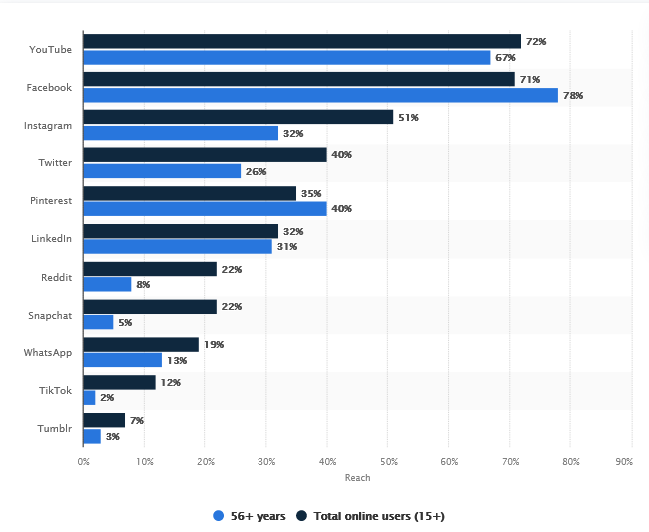Generational marketing: tips on how to sell to different demographics

Personalization is one of the most crucial ingredients in customer service and marketing. Everyone likes to think they are unique, and everything from traditional media like TV and radio to social media platforms like Facebook and Instagram offers targeted ads to help businesses sell effectively.
But while everyone wants to believe they’re unique, it’s no secret that different generations have different perspectives, simply because of the cultural forces that shaped them, and marketers have too many irons in the fire to market and convert different demographics.
The Covid pandemic intensified the obvious nature of the dividing lines between the generations by bringing a change in every consumer generation–how they spend time, which channel they choose to buy a product, how they interact with a brand, etc.
Whether now or later down the line, it’s inescapable that brands must shift to a generational marketing strategy to segment and target their customers. It’s how brands can maximize the impact of their marketing dollars.
Yes, factors such as income, location, and individual preferences will continue to be important, but generational marketing can help brands create effective personalized marketing campaigns. Let’s break down the main generations in the market – and how to reach out to them effectively.
Baby Boomers (1940s-1965)
Baby boomers are often dismissed by businesses in the 2020s, but that’s a potentially fatal error. After all, Boomers currently account for 54% of American household wealth – they’ve had the time to earn it, invest it, build their capital and establish themselves.
Can you afford to ignore the generation that owns more than half of the spending capital in the US?
There are stereotypes of Boomers, and some elements of those are likely to be broadly true. There may well be a strong nostalgic streak in Boomers – after all, they’re the generation that includes some of the most epoch-making events of the 20th century, from the end of World War II to Vietnam to the Moon landing.
Boomers tend to place a lot of value on person-to-person conversations, phone calls, a higher degree of courtesy, and traditional advertising in newspapers and on TV.
But if you categorize them as anti-technology fuddy-duddies, you make a big mistake. The Boomers are big on technology. A recent study of the generation showed that 78% of the participants had their own Facebook account, and most of them had embraced online shopping.

Source: Statista
Boomers delight in defying conventional portrayals, so to maximize your market penetration with them, you need to spread your efforts across the social media world. But the Boomers are also the generation that will most likely also give you a return on your marketing investment in traditional TV and newspaper ads, as 85% of Boomers stick to those channels.
Boomers appreciate straight talk, so you don’t need to be ultra-subtle in your marketing. Tell them the benefits they can receive from your product or service, and they’ll go about their day.
One extra thing to note about Boomers is that they’re from a time before “Built-In Obsolescence” or regular replacement or upgrade cycles were a thing. That means if you can get Boomers to buy from you, and you deliver a quality product or service, the chances are you’ll have made a customer for life, because the experience will resonate with those they had in their youth.
63% of boomers are active in customer loyalty programs to get discounts and offers. They appreciate the notion that loyalty should be rewarded, so engage them in contests, giveaways, deals, and loyalty program benefits (for example, cashback) to make repeat purchases. The more they perceive you rewarding them, the better they will judge their experience to be, and the more loyal they’ll become.
It’s also worth remembering that Baby Boomers are either retired or close to retirement, with a lot of money at their disposal. The Boomer market was worth US$548.1 billion in 2019. They don’t need to save money to acquire the necessities of life; they’ve been doing that all their lives. So, you’re more likely to make whole-price deals with Boomers, rather than long-term credit agreements, which is great for your short-term capital.
Boomers have had more life than any of the other active market generations, so they’re a great market for your more luxurious or high-end products.
Learn to love your Baby Boomers–they’re a generation, and a market, that respects straight talk and personal relationships, have hard cash to spend rather than long-term credit, and aren’t afraid to spend what they have. Treat them well, and reward their custom, and they could be your customers for decades to come.
Generation X (1965-1980)
Gen Xers make up around 20% of the US population. They’re busy right now with their kids, home, and careers, but they’ve set the stage for the first real digital natives. That means they’re cautious with where they spend the money they earn. While they are digital and tech-savvy, they prefer email marketing over other, more modern, channels, which they frequently see as fads or flashes in the pan.
In fact, Gen X is the most brand-loyal generation of them all, as they are generally less interested in trying out new brands, unlike Millennials, and surprisingly also unlike Boomers.
Since they’re brand loyal, reach out to them through loyalty programs and offer them a valuable experience that Gen Xers would want in their hustling lives. They want to be heard and acknowledged–there’s a generational meme among Gen Xers that they’ve always been forgotten or overlooks, so if you put in some effort to understand what they want, you can convert a brand loyal customer from a generation with a global annual buying power of US$2.4 trillion.
Be aware, though–Gen Xers are generally also inherently skeptical. They will research your brand and product before buying anything from you. And they’ll probably research a handful of your competitors, too. You can win their trust through review sites though and build a positive reputation among Generation X. Once they trust you, they are all yours! And when using email marketing, start including coupons, as 68% of Gen Xers have used coupons they received in the mail.
Generation Y/Millennials (1981-1996)
Millennials are relatively young, open to new products, platforms, ideas and technologies, and have a buying power of US$1.4 trillion.
They’re the first generation to have lived most of their lives in an internet-capable, smartphone-enabled world. But that doesn’t make them shallow, click-everything consumers.
Generation Y generally gives preference to perceptions of value over convenience. They’re fond of online shopping and consider reviews and references a major driving factor during purchases.
If you want to convert a millennial to your brand, create a solid brand reputation on review websites like Yelp. The more user-generated content you use, the more millennials you can convert, because to put it bluntly, they trust the experiences of their peers more than any marketing hype.
They are the most tech-savvy generation so far; they’re bound to be present on all social media channels, giving you the liberty and flexibility to reach out to them that way. But they attach extra value to brands that use their money to support a cause. So, to really win Millennial dollars, you can foster sustainable practices, have millennials beside you, and make a positive brand image in the market. It’s a win-win! But make sure you’re transparent and consistent in your marketing endeavors as this generation is the least loyal and will eagerly switch brands if they find anything goofy or socially unpalatable about your business practices.
Generation Z (1990s-2010s)
Gen Z or Net Gen eat, sleep, and breathe online content. Gen Zers spend a lot of their time online and are exceptionally tech-savvy, compared to Gen X. Online shopping is their thing, and they enjoy creating content on Instagram and Snapchat.
As with Gen Y though, never make the mistake of thinking their online lives make them suckers for obvious marketing hype. Quite the reverse, in fact – Gen Z has grown up in a world where marketing hype has achieved a degree of absurdity to rival the 1960s. But Gen Z is instinctively wise to marketing trickery and ‘salesy’ behavior. If they catch you at it, they’ll turn tail in a heartbeat and go with a competitor who they believe genuinely values its customers.
One of the most engaging ways to reach out to this generation is through videos. Create short and quirky videos on Snapchat, TikTok, and Instagram that captivate their interests. They respond to quirky visual media more than pages of product detail, and, more than any other generation, they respond to influencer marketing, which can help win their trust for your brand.
Traditional Facebook ads? Not worth spending your marketing dollars on if you’re exclusively chasing Gen Z customers. But if you can influence their favorite influencer, they’re 41% more likely to buy from you than from your competitor, of whom the influencer either speaks poorly, or more damningly, says nothing. If you’ve ever wondered exactly who so-called “social media influencers” are influencing–it’s Gen Z, almost but not quite exclusively. Naturally, you’ll need to be on all social media platforms to build your brand with Gen Z, but more than that–you’ll need to understand each platform, use it well, and ideally, support and court the latest influencer on the block.
Wrapping Up
Implementing generational marketing requires thoughtful planning. Developing an omni-channel communications strategy can help you target different generations across multiple channels. When you give more communication flexibility to your customers, it means more business, translating into more profits. Remember–you may not be able to please all of the generations, all of the time. But an intelligent, flexible, omni-channel generational marketing strategy will get you closer to your goals than you’ve ever got before.








